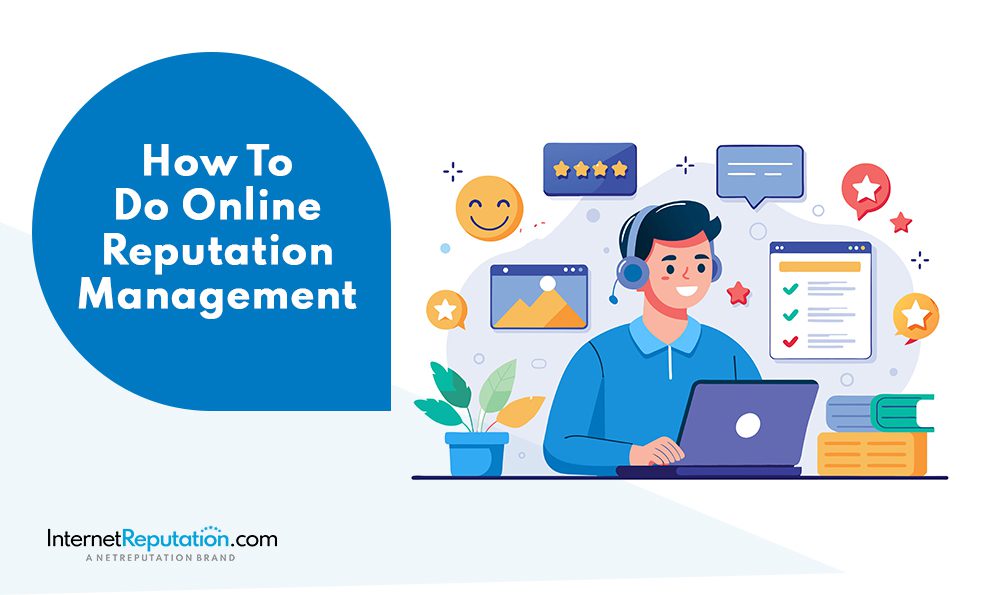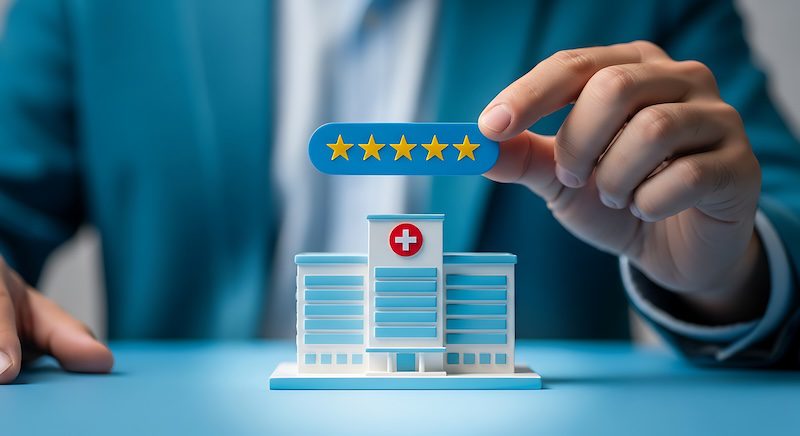How To Do Online Reputation Management in 2026

Learn how to do online reputation management with impactful strategies designed to help you achieve success.
Reputations matter. Think about famous products: The key to being a reliable brand is to build a good reputation.
To improve the online reputation of your company, invest in your marketing strategy. Ask yourself, “How can I build an online presence within my industry?”
Online reputation management controls how potential customers perceive your company, and ORM efforts can ensure that your business is a pillar in your niche.
We can help you create a positive online reputation, even if you’re starting from zero or rebounding from reputational damage. Call us at 941-259-4554 for more information.
Why Does Online Reputation Management Matter?

Only a few years ago, the web was very different. Corporations didn’t engage clients. Instead, they tried to sell to a passive audience.
People couldn’t express their voices in a powerful way. The communication landscape was very top-down.
The situation now is quite different. Websites are no longer static brochures. User-generated content is a must online. Regular daily interactions on social media accounts are vital to any business’s success.
No matter the size of your business, individuals are talking about you. This includes prospects, clients, and shoppers, not to mention their friends.
They’re making Stories about your newest product. They’re leaving a review on Google. They may also be posting a Facebook update about their buyer experience.
If you think you can skimp on reputation management, think again. If you think you can make it without considering the voices of the public, including potential customers’ voices, opinions, and attitudes, you’re mistaken.
In fact, considering your audience and their voice is more important than ever before. That’s where online reputation management comes in.
Why Reputation Management Is Important for Your Online Business
Building your online reputation matters. It matters to your clients and the growth of your business. Below are the top reasons why building your reputation matters and how an efficient online reputation strategy can benefit your business.
Online Reputation Management Builds Trust and Loyalty
Customers shop at certain brands because they’re confident they’ll receive excellent service. Trustpilot found that, according to over 95% of responders, the top factor that increases trust in a company is if it has a good online reputation.
This trust didn’t come from nowhere. Successful brands nurture trust online via a reputation management strategy.
Managing Your Online Reputation Will Grow Your Business
The more well-known your business is, the farther-reaching your online reputation will be. In turn, the more you’ll be able to gain your customers’ trust, and the more sales you will see. All of these things contribute to business progress.
Reputation Management Increases Online Visibility and Brand Credibility
Having an online reputation that’s growing lends credibility to your brand. With positive reviews, great customer support, and quality products, your trustworthiness will increase.
Google will reward you with increased rankings as a result. In this way, online reputation management also improves your online visibility. This makes it easier for customers to find you online.
Online Reputation Management Services Can Boost Conversions and Sales
Over 93% of online shoppers read reviews before making a purchase, and what they find in your online reviews matters. Less than 50% of customers will trust a business that doesn’t respond to its reviews, and if negative reviews show up in search results, consumers won’t go through with the purchase.
Overall, the more online reviews you have, particularly positive reviews, the more potential customers will trust your business and what you’re selling.
Encouraging positive conversations around your brand translates into more sales and repeat clients.
Building a Positive Reputation Controls the Narrative
Today, customers think of online reviews and personal tips, and they trust this feedback about as much as they would if it were coming from a friend.
If your reviews are impeccable, that’s great. But, what occurs if there’s a bump in the road — if someone posts a negative comment? Even worse, what happens if the negative feedback happens to be true?
In the age of social media, when information spreads like wildfire, it can create a PR crisis before you know it.
Online reputation management services typically include crisis management and repair. This allows you to tackle the problem head-on and get ahead of it so you can stay in control. Without an ORM team on your side when a crisis rears its head, you could be facing an online reputation nightmare.
Reputation Management Helps Your Brand Reach New Audiences
As your brand’s online reputation increases, so do your recommendations. Your clients will begin recommending your business to other potential customers.
Branded terms and keywords associated with your company receive a boost, too. You’ll enjoy better rankings and increased visibility online.
Together, these advantages let you reach new audiences.
There Is No Delete Button for Negative Reviews
The internet remembers everything. Negative reviews stick around. You have to respond to them. Don’t pretend they don’t exist.
By using review management tools, you’ll be able to turn an unhappy customer into a loyal fan. Or, you’ll at least show the rest of your audience that you handle customer service like a professional.
BrightLocal found that a majority of consumers expect a response to their review in 2-3 days, and the longest time they’ll wait is one week. Moreover, Sprout Social found that 76% of customers notice and appreciate when brands prioritize support.
How Is Online Reputation Management Different for Executives?
Many brands have developed intrinsic ties to their founder or CEO in the public eye. This is even more true if there’s a powerful company origin story. For example, you can’t describe Tesla or SpaceX without mentioning Elon Musk.
While not every CEO desires to be well-known, it’s often a byproduct of running a well-known brand. Because of social media channels, CEOs tend to be in the spotlight. And the public takes missteps seriously.
Controversial personal habits or professional actions by CEOs spark damaging news cycles and social media boycotts. A single social media post can send stock prices plummeting and drive away buyers.
When a CEO has reliable online reputation management, they’re able to establish a legacy they can be proud of, one that extends beyond their management role in the company.
Why CEOs Must Prioritize Online Reputation Management
Business leaders are under constant scrutiny. Their reputational risk can pose a strategic risk to the business.
The first step to managing reputational risk for CEOs is to control their own narrative. Some ways to accomplish this goal include:
- Having a clear company vision
- Being inspirational and motivational
- Exhibiting honesty and ethics
- Practicing good internal communications
- Caring about the well-being of employees and company culture
- Having a global business outlook
- Having good external communications and public relations
- Being decisive
- Maintaining a focus on the client
Most of a CEO’s narrative takes place on social media. Savvy executives understand that online reputation management in the social media space is an important skill to master.
Is My Company at Risk of an Online Reputation Smear Campaign?
The upside of being online is how fast you can reach potential customers. Unfortunately, how quickly information can spread may also be a downside at times.
Being able to catch the eye of your audience online is great. But sooner or later, you could turn into a target for negative reviews and other types of online attacks.
On the internet, negative reviews can spread fast. They may cost you hundreds of dollars a day (or even more) in lost business.
With traditional, offline media, it’s easier for individuals to forget those negative comments. Online, though, the permanency and accessibility of search engines can turn negative content into permanent records.
Until you do something, users will continue to find these negative results on search engines. Worse, they’ll continue to base their choices on them.
Negative feedback is nothing new, and every brand deals with it from time to time. So, what happens when someone in your industry — a competitor, for example — starts an online smear campaign against you or your business?
Understand the Different Types of Negative Feedback
It’s important to distinguish between different types of negative feedback. By knowing exactly what you’re dealing with, you’ll be able to make a plan to fight against it.
Plenty of negative feedback gives you the chance to interact and reply. Then, there’s a type of negative feedback that’s intentionally malicious and doesn’t leave much room for engagement.
Listed below are two basic types of negative feedback:
- A real customer has a genuine complaint about your brand, product, service or something else related to your company.
- Someone is systematically attempting to destroy your business. They do this by harassing you and leaving negative feedback online. This individual is out to defame your business.
Our clients come to us when they need to build or repair their online reputation and take control of their digital presence. Call us at 941-259-4554 to learn more.
How To Fight an Online Reputation Smear Campaign
Let’s go over exactly what to do if your brand is dealing with an online reputation smear campaign. Many of these tips are also great to apply to your overall reputation management strategy.
Use Search Engine Optimization (SEO)
Search engine optimization (SEO) is a method of creating and promoting content online. When done well, SEO means that if someone searches for your business name or variations of it, the results that show up will be neutral or positive. Most importantly, they won’t be negative.
SEO is much simpler if you’re proactive about it. Reacting to negative press and reviews by launching an SEO campaign is going to be much more difficult.
Search engine optimization is complex, but there are a few things you can do on your own before hiring an ORM company.
For example, set up social media profiles on Facebook, Instagram and other platforms where your audience spends their time. Be active on those profiles so your social media content starts ranking in search engines.
Promote the Positive to Displace the Negative
Do a search to get search engine results on variations of your business name within the major SERPs. Discover links to stories that are helpful or reflect well on your business. Link to these stories on your website. Include links on your blog and different websites or press releases.
Learn more about our SEO services here.
Document Negative Content
Save all emails or URLs with abusive or defamatory content about your business. If it’s on another website, report it to the admin who owns the website.
Some websites have policies in place for this. They can flag or review the negative material. They will also penalize or block the particular person posting it.
Check e-mail addresses or details that give clues about the identification of the individual trying to harm or ruin your positive reputation.
Avoid Overreacting Online
While you want to reply to negative feedback in a timely manner, wait to cool down before you fire off a quick retort. Stay neutral and focus on customer service. The important thing here is to reply, not to react.
Ask for the person’s contact info so you can take the conversation offline and work toward a resolution together.
Keep in mind that responding is positive, and it will likely serve you well in the future. On the other hand, overreacting is negative. It only perpetuates the issue and could encourage even more negative attacks.
Consider Taking Legal Action
Some businesses decide to sue review sites that publish defamatory negative reviews.
This is an expensive and prolonged process. Make sure you’ve exhausted all your other options first. This is your absolute final line of protection against an online smear campaign.
Essential Elements of a Digital Reputation Management Strategy
Now that you know how to combat a PR crisis in the event of a smear campaign, what about the basics of ongoing reputation management? Here’s what you’ll need to do to encourage positive reviews, grow your customer base and take the lead on your competitors.
Perform an Audit of Your Online Reputation
Your first step is to conduct an extensive online reputation audit. Do this before starting any online reputation management process.
The idea of an online reputation management audit is to uncover how individuals see you online. It also puts a spotlight on any reputational issues you may be dealing with.
Your audit will help you answer the following questions:
- What top websites in my search results do I’ve control over?
- What varieties of websites do I see appear for my brand name search?
- Am I popular online?
- Is the overall sentiment for my business positive or negative?
To do a proper audit, you need to do some brand monitoring.
How To Monitor Your Brand Online
When conducting an audit of your brand’s online reputation, follow these steps:
- Open an incognito window in your browser. Enter your brand name into the search field.
- Take a good look at the websites that appear on the first search engine results page.
- Identify any Google-related results that show up, such as a Google Business Profile with reviews. Evaluate your presence there: ratings, feedback, reviews, user-generated pictures, etc.
- Separate the web pages you find into (1) those you control, (2) those you have limited power over and (3) those you have no power over.
- Together with your social media accounts, the web pages you control are highly manageable. Make whatever changes are necessary to protect your reputation.
- With third-party listings, reach out to website owners. Ask them to remove misleading content.
InternetReputation.com provides the information and services you need to protect your digital presence. Get started with a free online reputation analysis by calling 941-259-4554 today.
Provide 24/7 Customer Support
Clients might be shopping on your website and making purchases at all times of the day and night. Your business may have operating hours, but customers shop 24/7. Offering some type of around-the-clock support is important to satisfy your audience.
It’s best if your support team is able to always be on. But if that’s not possible, offering clear self-help steps on your website or a support chatbot may be enough until you’re back online and can provide personalized help.
Also, clarify how and when you’ll respond to their messages. Let them know when you’re available and how they can expect to hear back from you.
For example, an automated message that says, “We’re offline now, but we’ll be back on tomorrow at 9 a.m. and will send you an email by the end of the day,” will set their expectations.
By being inaccessible, you could lose revenue and miss out on potential clients.
Build Industry Relationships
Business success isn’t achieved alone. Companies that have built good reputations haven’t done so in isolation. Instead, they’ve taken the time to build positive relationships with other companies. They’ve also made friends with journalists and influencers in their niche.
It’s crucial to build professional relationships with others in your niche. Taking the time to build positive relationships can:
- Retain current customers
- Improve your business
- Boost your reputation
As you connect with different influential business owners, journalists, and experts, you’ll have new brand advocates.
Having these solid relationships is great, especially when you want professional advice or information. They’ll also be beneficial as you look for link-building and partnership opportunities. When you have a strong network, you can connect with the individuals who matter and you’ll discover untapped opportunities for you and your business.
Become an Industry Authority
One of many ways you can build your online reputation is by becoming an authority in your industry.
You know you need to develop your business into a recognizable brand. You want your brand to be so well-known that your website, yourself, and your staff are where people go for solutions to their issues and professional recommendations.
There are lots of ways to become an industry authority, and one of the most valuable strategies is link-building.
Having a powerful backlink profile (links from different websites directing users to your website) shows your clients and Google that your website is a beneficial source of information.
Link-building takes time and investment. But, as your backlink profile grows, so does your online authority.
Turning into an authority via link-building is among the most effective ways to build your online reputation and develop your business.
Get Active on Social Media
Having a social media presence has a huge impact on your brand reputation. On average, users are on social media for nearly 2.5 hours per day, and they spend time on over 7 platforms each month.
- Customers count on their favorite brands to be on social media.
- Social platforms allow businesses to connect with their clients on a more private level.
- You can showcase your brand to a wider audience and highlight your authenticity and individuality.
The more active you are on social media, the better. Use social platforms to interact with your clients as well as new audiences. You can also use your accounts to promote your business and provide excellent customer support.
Being active on social media will improve your brand reputation, connect with your clients, and help you grow your business.
Support Good Causes and Drive Positive Change
Supporting good causes is a great way to improve your business reputation. At present, shoppers are more invested than ever before in companies that support good causes and are driving positive change. Customers care about things like sustainability, ending homelessness, and caring for wildlife.
Think about your specific audience and the causes they care about. Then, decide if the cause is a good match for your brand.
You may donate to charity, partake in community fundraisers, help small businesses, supply products locally, or work toward being carbon neutral.
Turn Into a Thought Leader Online
A thought leader is someone who has new, unique views on a topic in their niche. Becoming a thought leader in your industry is an effective way to increase your brand reputation online and drive business success.
To become a thought leader, work with mentors and influencers within your area of interest. You can’t grow to be good at business without learning from those who have gone before you.
Study their successes and failures, and take their advice to heart. Whether you choose to do things in a different way or the same way, taking the time to learn from others will benefit your business.
Take Advantage of Reputation Marketing
Reputation marketing is the method of managing how your brand comes across. It helps to ensure that others’ perceptions of your business are positive. It seeks to focus on the positive qualities of your brand and promote them in the best light as a way to connect with your clients.
Reputation marketing also matters because we live in a multichannel world. It’s easier than ever before for customers to find what they’re searching for online. There are numerous services, products, articles, and more all scrambling for first place.
With reputation marketing, you can use positive customer reviews and social media shoutouts to your advantage. Glowing feedback helps your brand stand out and attract new clients.
Demonstrate Experience, Expertise, Authoritativeness, and Trust (E-E-A-T)
The idea of E-E-A-T comes from Google’s Search Quality Evaluator Guidelines. It’s one factor that Google uses to evaluate the general quality of a web page. It helps to ensure Google returns correct, truthful, and helpful info to searchers.
To improve your E-E-A-T online, you need to master your reputation management. You will need to do the following:
- Earn topical backlinks
- Gain mentions from trusted sources or influencers in your niche
- Create accurate and up-to-date content on your website
- Get more positive reviews
- Use expertly sourced materials
- Build your credentials
- Share your contact details
All of these elements play an essential role in growing your online reputation and authority.
Do you need to speak with an expert about reputation monitoring, management or repair? Get in touch with us by calling 941-259-4554 today.
How To Get Started With Social Media Marketing
We have already covered the importance of social media, but to be able to connect with your audience, you should commit some time to social media advertising and marketing. Professional social media marketers can work with you on defining your target audience in order to create content that your audience wants to see.
As engagement grows and your following increases, more opportunities will open up. You’ll be in a great position to start reaching out to influencers and requesting opportunities for content collaboration. This helps increase your reach, gain the trust of your followers, and build brand awareness.
By using social media advertising and marketing, you’ll be able to grow your online reputation. You’ll reach the individuals you want to. With the proper social media planning and strategy, you’ll have a social media presence to rival your competitors.
Connect With Competitors
Maybe this sounds like an odd suggestion, but building relationships with your competitors will be useful for your business.
While it’s natural to view your competitors as the enemy, they’re actually a great resource. Collaboration is a good way to combine forces and reach a bigger audience. Why not work together to create something brand new?
For example, you may decide to work together to create a new service. Or, you could collaborate to develop a unique product. Or maybe you’ll just get together to launch a fantastic joint discount for your clients. The choices are endless.
Successful competitor collaborations can improve brand visibility, engage customers, and reach wider audiences.
Network and Build Connections
Networking is a vital factor in increasing your brand reputation. The more individuals you talk to about your business and what you do, the more you increase awareness and build connections.
Participating in conferences and events boosts visibility. Attending virtual summits and connecting with others in your industry is a great idea. Being featured on others’ podcasts is another smart way to build your brand reputation.
Consider Influencer Marketing
Discovering the proper influencers to work with might be tough. But, as soon as you find someone to collaborate with, you will have a brand ambassador. They can increase your positive online reputation. They can provide help to reach new audiences and boost conversations about you, too.
Do your research and define your budget before reaching out to influencers. Ask yourself these questions:
- Who is your target audience?
- What do they need?
- How can you help them?
- What is your budget?
- What are you offering?
By having clear answers to those questions, you can find an influencer who matches your goals.
Give Back to the Community
One of the best uses of social media is as a platform to stand up for causes you (and your audiences) believe in.
Do you care about the planet? Promote sustainability and help local charities by planting more trees. Do you care about education? Sponsor local schools to purchase the gear they need.
Giving back is a crucial part of running a business and ensures you’re driving positive change both for your clients and for your community.
What’s more, you might even receive media coverage, which could boost awareness of your brand.
Online Reputation Management in 2026 is About More Than Doing Good Business
Effective marketers are integrating online reputation management into their overall digital strategy. This is to make sure they have continued business progress and success.
Understanding how to influence the purchasing choices of today’s customers puts you ahead of the curve. Optimizing their experiences requires the proper blend of people, processes, and technology. Building and maintaining a powerful online reputation requires work and strategy.
An effective ORM program will:
- Establish an accurate online presence. Audit and correct business listings on all major directory and review websites, especially Google.
- Check and reply to reviews on major third-party review websites.
- Request reviews from all your clients. This builds an accurate picture of the service you deliver.
- Use advanced analytics and reporting. This allows you to uncover and share valuable insights. They give you a peek at the unstructured text from online reviews and social media.
- Take action on candid customer feedback. Make sure to reply to reviews and social feedback. This improves customer experience.
There are so many opportunities for customers to express their opinions about your company online. They have a direct influence on your company’s success. Your business’s online reputation has never been more important.
At InternetReputation.com, we provide ORM information to individuals and businesses who want to create, grow or repair their online presence. Our process includes analysis, web property development, content creation, publishing and promotion.
Give us a call today at 941-259-4554 to learn more.
Last updated 12/2025











